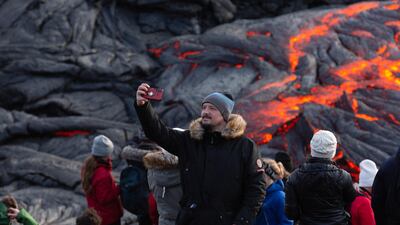Lava and steam opened a new fissure at an Icelandic volcano, forcing hikers to be removed from the area.
The 500-metre crack, which was spotted by a sightseeing helicopter, is about one kilometre from the original eruption site in the Geldinga Valley two weeks ago.
The volcano does not present an imminent danger to life because it is far from the popular hiking tracks, but sightseers who made special trips to the area were moved on.
Search and rescue worker Sigurjon Veigar said his team “evacuated the area” in which people were “looking at the eruption because we had two new cracks opening up”.
The new stream of lava ran down into another valley, called Merardalir, and a long stream of smoking magma flowed through the hills only a few hundred metres from the new fissure, the whole scene shrouded in gases.
The lava was moving at nearly 10 metres per second down the steep slope “but it has slowed considerably”, volcanologist Thorvaldur Thordarson said.
“My feeling is that I don’t see any sign of this stopping. We’re going to see this for a while.”
Scientists were on their way to analyse the crack, Iceland’s Meteorological Office said.
Another search and rescue team member at the site, called Bragi, said the fissure that opened up was “still growing”.
“Now, there’s uncertainty in the area, so we evacuated all the tourists out of the area and are waiting for it to stabilise.”
Experts, who initially thought the eruption near Mount Fagradalsfjall would be short-lived, now expect it to last at least several weeks.
The volcano is 40km from Iceland’s capital, Reykjavik.
Iceland has more active volcanoes than any other country in Europe, but the Reykjanes Peninsula has not had an eruption since the 13th century, although that one lasted from 1210 to 1240.
In 2010, an eruption at the Eyjafjallajokull volcano sent huge clouds of smoke and ash into the atmosphere.
It disrupted air traffic for a week and more than 100,000 flights worldwide were cancelled, leaving about 10 million passengers stranded.









